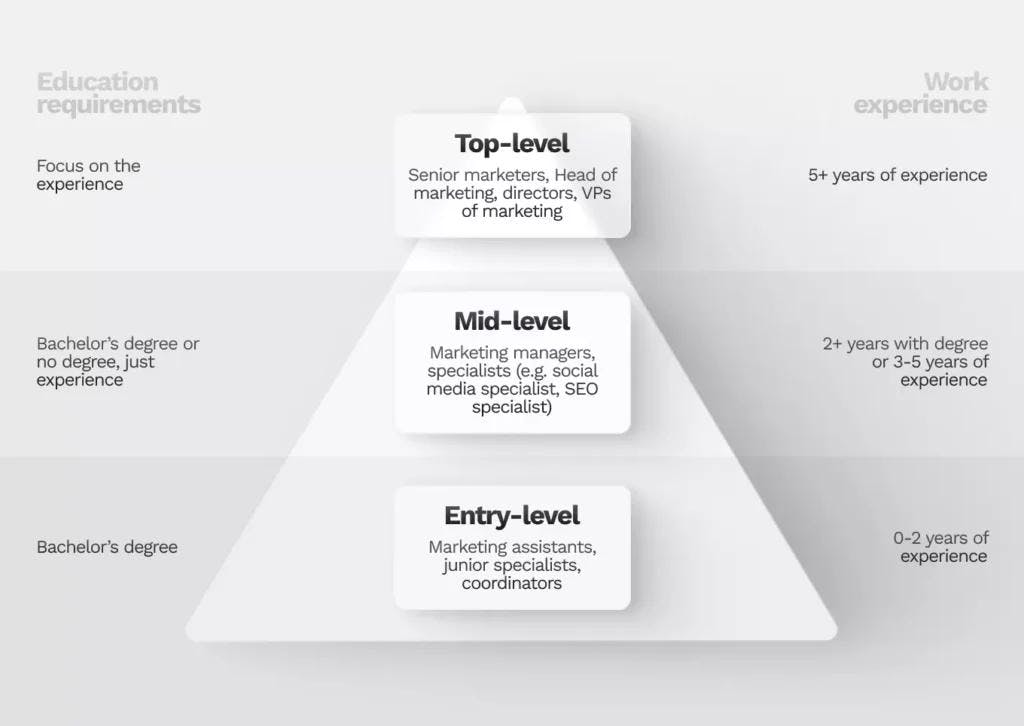The Marketing Career Path: Areas, Positions & Requirements
Looking for a change in career or want to know what options you have in marketing going ahead? To give you a good idea of what a career in marketing can offer, today we’ll talk about the areas of marketing you can work in and the specific positions you can have. So join us and let's see what each step on the marketing career path might look like.
The areas of marketing
Before we start climbing up the career ladder, let’s talk about the different areas of marketing you can get into. Even if you aim to be a generalist who knows a little bit of everything, it’s good to learn about the options for specialization.
Market research
The goal of market research is to better understand a company’s target audience. It’s unsurprisingly quite a data-heavy field that involves going through and making sense of lots of insights, both quantitative and qualitative.
But market researchers then get to help their teams find the perfect people for their products or services. They fine-tune their strategy and product positioning and polish their representation so that their audience simply can’t resist the offers.
Media planning & buying
Have you ever seen a billboard or poster that was just so brilliantly placed? A commercial that appeared at the best possible timing? That was thanks to media planners and buyers, figuring out that perfect placement and snatching the spot for their company.
These positions are kind of niche, usually found at advertising and marketing agencies.
Brand marketing
Brand marketing is responsible for the positioning, appearance, and representation of a company, and/or its products and services. People working in this area establish guidelines for how the brand should appear online or offline—and make sure everyone is following them.
They coordinate with the market research team to find the best positioning in the market, set the pricing strategy, supervise the initial go-to-market process, and later manage the ongoing campaigns.
Product marketing
As the name suggests, this area revolves all around marketing a product. Whenever a company doesn’t have dedicated and separate brand marketing, market research, and such teams, they’ll have one for the product who takes care of it all.
It’s definitely a multi-faceted part of marketing that requires both creativity and analytical skills. Whoever thrives in a strategic yet eventful position would love being part of a product marketing team.
Digital marketing
Out of all of the listed areas, digital marketing has been the fastest-growing and most popular branch in the last few years or even decades. It is actually a broader term, as a digital marketing career path can include work in…
- social media,
- content marketing,
- email marketing,
- PPC, or
- data analytics.
Digital marketers work in-house, in agencies, or even freelance —covering one or multiple of the fields we listed above.
A little disclaimer: this list is not exhaustive. There are fields, especially in the realm of traditional (aka not online) marketing that we don’t cover here. Otherwise, this article would be way too long to read. But we tried to get a good bunch of the most popular ones for you.
Now that you’re familiar with the most popular areas of marketing careers, let’s take a look at the different levels of the marketing career path. We’ve analyzed hundreds of marketing portfolios and dozens of job posts to give you more information about the requirements and positions at each stage.

The entry-level on the marketing career path: assistants & coordinators
Entry-level marketing positions are the ones you can get with zero or just a year of work experience. You might find the word “junior” in their title —or they’re also often labeled as assistant or coordinator positions.
The interesting thing is that even though they often don’t require much previous experience, most junior marketing job posts do ask for a Bachelor’s degree. It could be in business, marketing, communications, media, or even journalism. One that proves your analytical and research skills while also hinting at your creativity and being great at writing.
The mid-level in marketing: managers & specialists
The next step up from being an assistant or coordinator is becoming a marketing manager or specialist. For the latter, you’d probably have the specific expertise in front, such as an SEO specialist, social media specialist, or marketing automation specialist.
Managers on this level might be managing a team, usually a relatively smaller one, but that’s not always the case.
You could be a marketing manager without a team —then the name in the position would mean that it’s a complex one, overseeing multiple aspects of the company’s marketing efforts. A position that’d require substantial experience, outstanding skills, and the ability to problem solve and work independently.
Education and experience requirements for marketing managers
Whether we’re talking about the degrees or work experience companies require on this level of the marketing career path, we can categorize them into two groups.
During our research, we found that half of the companies ask for a bachelor’s degree when recruiting for marketing manager or specialist positions. The other half though is okay with just the experience.
That doesn’t mean having a degree will be a disadvantage, but just know that these companies will expect you to have experience, regardless of your degree.
And how much experience do they typically ask for? About half of the companies seem to settle for 2+ years for mid-level marketing positions. But those 2+ years should be super relevant to the job and your skills need to be up-to-par.
In the other half of marketing manager and specialist job posts, you’ll find they ask for 3-5 years of experience.
The top of the marketing career path: seniors, directors & VPs
When you get past being a marketing manager, you’ll likely land:
- a senior position where you’re still actively working on marketing, although taking more strategic tasks than before, and aiding the juniors on your team, or
- a leadership position where you’ll be the head of possibly the whole marketing department, having others (who might even have their own teams) report to you.
In the latter role, you won’t do any of the execution and will shift more into a managerial/leadership mindset. You’ll still have a say in strategy and will take all the responsibility for big marketing decisions. But it’ll be based on research others your team did for you —and they’ll also be the ones executing it.
So if you’re not interested in the leadership aspect of being on top of the marketing career path, aim for a senior marketer position. You’ll get to do what you love (marketing) while aiding others less experienced.
The most sought-after skills for marketing careers
Although the skills companies ask for often depend on your specialization, there are some skills that tend to appear in marketing job posts over and over again, regardless of the seniority level.
Over half of the job ads we analyzed asked marketers to:
- have great attention to detail,
- be team players,
- have exceptional communication skills,
- be able to multi-task and work in fast-paced environments, and
- have experience with CRMs and other marketing automation tools.
Not surprisingly, these are mostly soft skills that characterize great marketers. Marketing professionals most often work in teams—with other marketers, designers, developers, and the list goes on. So being a team player is a no-brainer.
They also interact with clients and customers, where communication has to be smooth and efficient. And you know how they often publish posts and send out emails to thousands of people? Without proper attention to detail that could lead to real embarrassing marketing fiascos.
The only strictly marketing-related skill is knowing marketing automation tools.
Over 30% of companies wanted their future marketing colleagues…
…to be familiar with:
- Social media
- Analytics
- CRO (conversion rate optimization)
- Project management
- Writing
We also often saw companies asking for experience with planning, launching, and managing campaigns, familiarity with PPC (pay-per-click advertising), and involvement in marketing strategy and creating roadmaps. The latter usually popped up for more senior positions on the top level of the marketing career path.
Don’t forget though that these are the more general requirements —you’ll need specialized skills of whatever area of marketing you choose to go into too.
How to start your marketing career
You might have just graduated from college or you could be looking to switch from another career path. Whichever is the case, here are some simple steps you can follow to get into marketing.
- Find the area of marketing you’re interested in
Although you can definitely be more of a generalist, knowing and doing a little bit of everything, we recommend you to still find an area of marketing you like. This gives you the chance to really deep dive into that one niche and become a true expert.
Bigger marketing teams are also built of these experts too, so finding a marketing job will also be easier if you do decide to specialize.
- Learn and improve your skills
Once you know which area sounds right for you, it’s time to learn more about it. Don’t worry, we’re not going to tell you to enroll in a Marketing BSc right away. They often don’t teach these very specific skills anyways.
Instead, try to look up online courses and certifications from reliable sites. Google has some great free courses and so does LinkedIn, for starters. And also don’t underestimate the power of research: search for different topics and methods and try to learn from articles and videos as much as you can.
You can go for the certificates you can later showcase on your LinkedIn or website, but the most important here is to gain skills and a better understanding of your chosen niche.
- Try your marketing skills IRL
You might never feel like you know enough and that’s okay. But when you’re starting to get the hang of it, it’s time to give it a try. Try your marketing skills in real life, by taking on some projects.
Find some friends who might need help with business or even personal brands. If you decide to go for content marketing, reach out to do SEO audits for people. Interested in social media? Create a social media strategy and content calendar for someone for the next quarter.
And even if you can’t find anyone to take you up on the offer, you can still do it. For yourself, or for an imaginary brand even. The most important thing is to practice and try your hand at it.
- Create a marketing portfolio
This brings us to this last step, as those practice projects will be perfect materials for your marketing portfolio.
In order to stand out in the sea of applicants, you’ll need a portfolio if you want to work full-time, or to catch the attention of potential clients if you freelance. Your portfolio will show people your skills and way of thinking, even if you don’t have much marketing experience.
The easiest way to create one is with a website builder like Copyfolio, which was designed for writers and marketers. All you have to do is choose a template, add your projects, and customize it to your liking. With your projects prepared, you can build a whole portfolio website during your lunch break.




